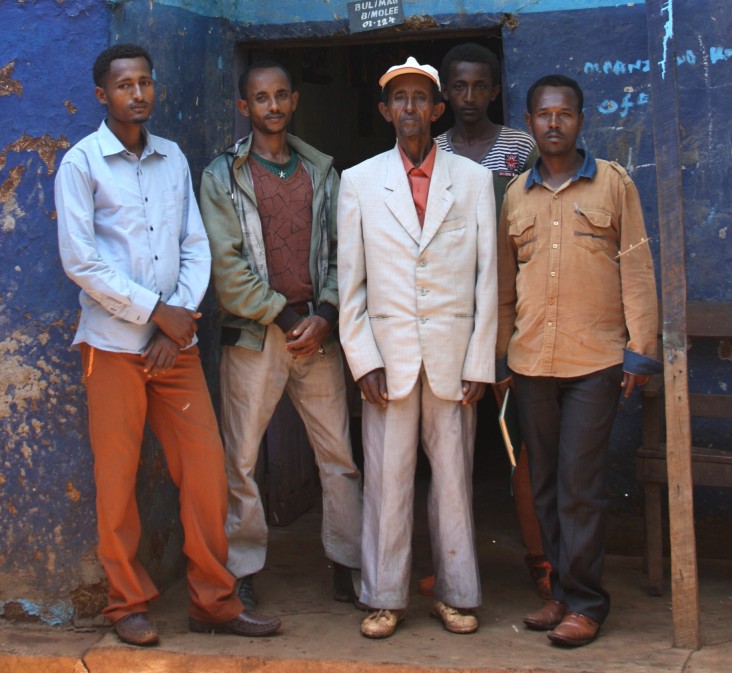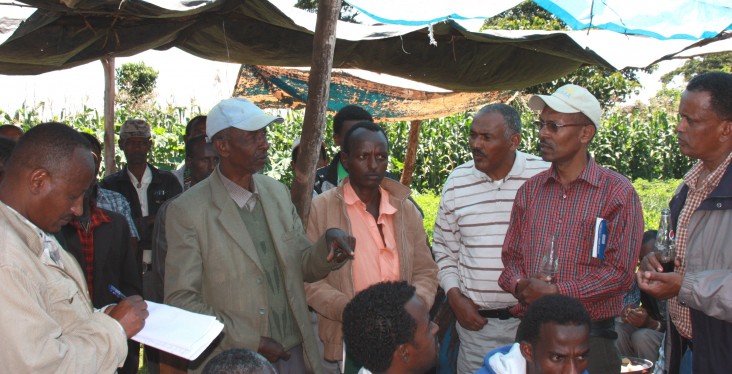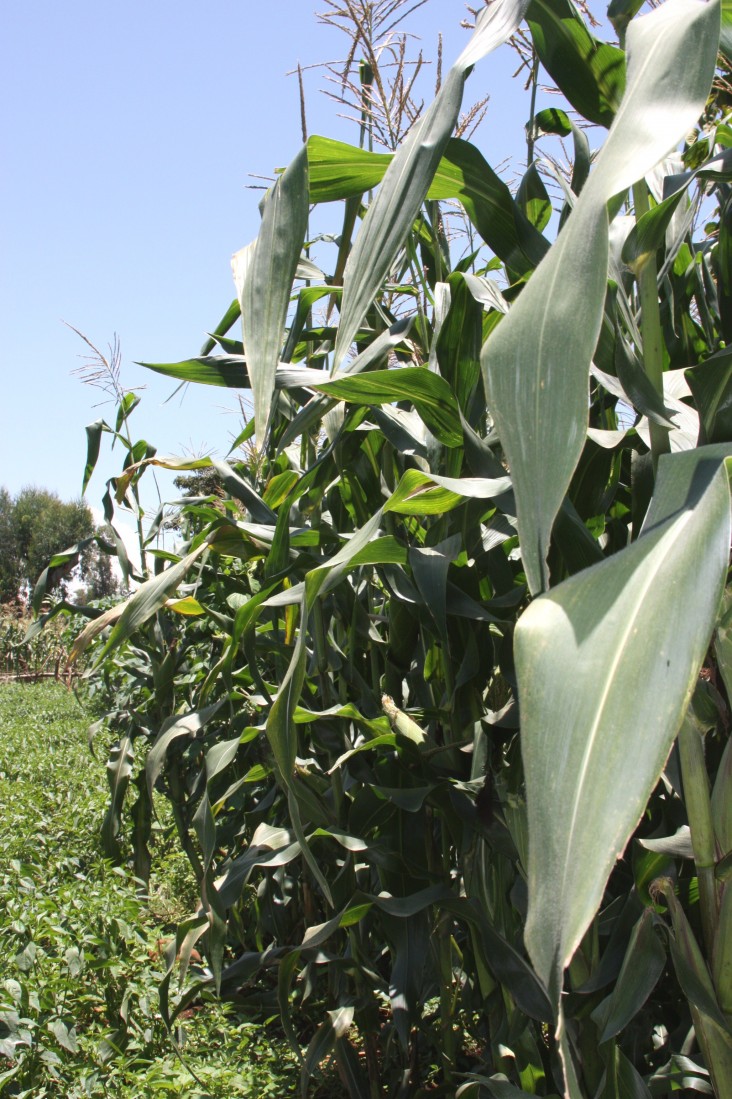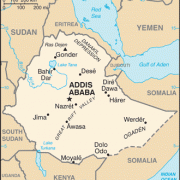 Brothers Bedasa, left, and Debela Ofosea pose where their two maize fields meet. They planted each field with hybrid seeds distributed under a USAID program.
Lauren McCarty, USAID
Brothers Bedasa, left, and Debela Ofosea pose where their two maize fields meet. They planted each field with hybrid seeds distributed under a USAID program.
Lauren McCarty, USAID
 Brothers Bedasa, left, and Debela Ofosea pose where their two maize fields meet. They planted each field with hybrid seeds distributed under a USAID program.
Lauren McCarty, USAID
Brothers Bedasa, left, and Debela Ofosea pose where their two maize fields meet. They planted each field with hybrid seeds distributed under a USAID program.
Lauren McCarty, USAID
As two of the oldest farmers in their village, brothers Debela and Bedasa Ofosea have spent their entire lives farming in a small village outside Nekemte, Oromia, in Ethiopia. Both brothers, in their fifties, have seen only gradual improvements in farming techniques over their lifetimes, however, the biggest changes have come in just the last couple of years.
“After attending training, we started row planting instead of just plowing with oxen. We are also using improved types of fertilizer and new seeds,” said Debela. “All of these improvements will make for better yields, not one part alone.”
The brothers are two of the initial participants in the Advanced Maize Seed Adoption Program (AMSAP), a New Alliance for Food Security and Nutrition partnership between USAID, DuPont Pioneer and the Government of Ethiopia. Launched in 2013, AMSAP aims to increase the productivity of smallholder farmers by giving them new, high-quality options for maize seeds as well as improving seed distribution and post-harvest storage.
Increasing farmer productivity is important for Ethiopia’s economy, with more than 80 percent of the population earning a living from agriculture and more than 8 million smallholder maize farmers. Yet, the demand for maize currently outpaces supply. Ethiopia’s smallholder farmers are unable to take full advantage of this market opportunity because they struggle with poor yields due to low-quality seeds, and post-harvest losses due to insufficient storage, mold, vermin and theft.
“Farmers in Ethiopia are very similar to farmers in other countries. We view them as change agents and consider that their role is very significant in ensuring food security in Ethiopia,” said Lystra Antoine, director for agricultural development at DuPont Pioneer, an Iowa-based company that develops hybrid plant seeds for farmers around the world to best fit the conditions in which they will be grown. “Through AMSAP, we are giving these farmers a risk-free way to experience a new technology. Once they experience the technology, they are then willing to invest in it.”
In addition to providing improved maize seeds, the AMSAP partners use demonstration plots to show lead farmers in Ethiopia the hardiness of the new hybrid seeds, as well as best practices for planting, weeding, fertilizing and harvesting to generate the highest yields. These lead farmers serve as guides to other farmers in the surrounding communities who want to purchase new seeds.
USAID’s Agribusiness Market Development project, funded by the U.S. Government global hunger and food security initiative, Feed the Future, and operated by ACDI/VOCA in Ethiopia, trains extension workers, farmers’ cooperatives and agriculture training centers to disseminate information on the improved seeds, post-harvest loss prevention, storage, marketing and best farm management practices. USAID also worked with the non-profit CNFA to create the Ambo Community Farmer Service Center, the first resource of its kind in Ethiopia where farmers can buy quality inputs and learn new techniques.
“In one day, we could have more than 100 people come to get service here,” said Gadisa Gobona, owner of the Ambo Community Farmer Service Center in Oromia.
With the success of the first center, five more centers have opened in Ethiopia to provide additional support to local farmers.
Previously, most farmers bought their seeds and inputs from cooperatives, which usually did not offer any choice of seeds. Now, through the centers, farmers have options for quality tools and inputs as well as getting agronomic and veterinary advice. The DuPont seeds sold in Ethiopia produce greater yields in the country’s climate.
“The AMSAP partnership is actually a fantastic example of a very well-functioning public-private partnership in Ethiopia,” said Khalid Bomba, CEO of the Agricultural Transformation Agency. “AMSAP brings together one of the world’s leading agriculture companies, DuPont Pioneer, along with one of Ethiopia’s most important development partners, USAID, to bring to fore a market-based solution for smallholder farmers.”
The AMSAP partnership illustrates how to make operational government and corporate commitments made under the New Alliance for Food Security and Nutrition launched at a G-8 meeting in 2012, and achieve the goals of Feed the Future.
“The AMSAP model highlights the potential of countries and companies to work together to grow markets in countries like Ethiopia with tremendous agricultural potential and lift poor smallholder farmers and their families out of poverty with better and steadier incomes,” said Dennis Weller, USAID mission director in Ethiopia.
Bedasa and Debela both attended agriculture extension training in 2013 and planted their fields using the new hybrid seeds and updated farming techniques. With measurable growth in their yields after one season, the brothers planted even more improved maize seeds in 2014 and look forward to greater harvests in the future.
Each brother has about 4 hectares of land, half planted with maize as of 2013. They planted only a portion of the maize crop with the new seed that first year. After the success of the first season, the brothers will plant maize almost exclusively with the new seed.
“The growth of the corn is faster and more vigorous this year [2014]. We expect better yields than we had before,” said Bedasa. “The maize this year has one to two more ears per stalk and is a deeper green when we look at the leaves.”
Across Ethiopia’s Amhara, Oromia and Southern Nations, Nationalities and People’s regions, farmers have seen similar results from the new maize seed and improved farming techniques. In 2013, the AMSAP program started with 320 lead farmers whose average yields more than doubled. In 2014, the program grew to 10,000 farmers, and AMSAP partners expect to reach 32,000 farmers by the end of 2015.
With so much early success, in February 2015, USAID, DuPont Pioneer and the Ethiopian Ministry of Agriculture signed an amendment to the original AMSAP agreement to scale up the project with additional resources to reach 100,000 farmers through 2018.
Improved yields mean big changes for the brothers’ households and their community. After planting new seeds and using new farming techniques last season, Debela has been able to do home improvements.
He proudly tells visitors, “We improved the condition of our house last year, changing a grass roof to a corrugated tin roof.”
Both brothers see more long-term gains as well.
“With better yields, we will be able to continue paying for school for our kids and keep improving our lives. In our community, many have already been able to construct new houses in town,” said Debela. “We will also be able to save money in the bank and use it to buy farm tools in the future.”
“We currently shell by hand and it is very tedious,” said Bedasa. “We will improve even more when we can afford a mechanical sheller.”
With better harvests from quality seeds and improved farming techniques, the brothers and other farmers in the community say they will move beyond subsistence farming and strengthen their ability to withstand increasing weather or economic shocks. Greater income also means the farmers can pool their resources to invest in new, especially mechanized, farming equipment that will substantially increase efficiency and accelerate productivity for years to come.
When asked how well they get along working so closely together, each brother starts laughing. “We will continue to work together if our yields continue to improve,” said Debela.















Comment
Make a general inquiry or suggest an improvement.